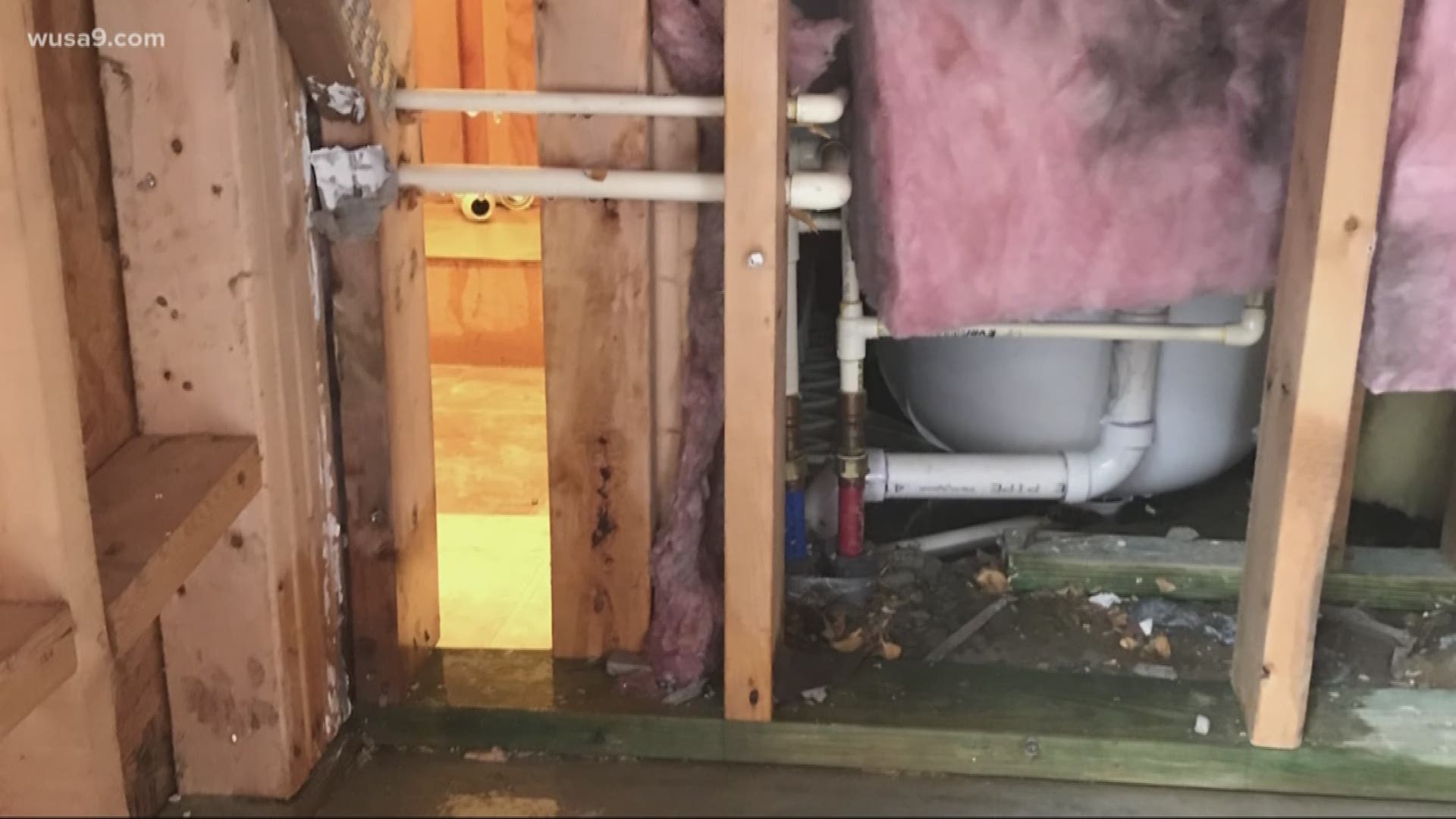WASHINGTON -- A report released Wednesday shows military families are living in dangerous conditions on bases. These are the people who are charged with protecting our freedom and yet, at the same time, they are fighting for their own safety inside their homes. The new data gives a detailed picture of what life looks like at local bases in Washington, D.C., Maryland and Virginia.
Pictures of the homes of military families make you think – ‘who would want to live with this?’ They show rodent skulls children found at that back door, mold covering insulation and lead paint chipping off a door frame.
All these people want is a safe place to live, but that’s what they're dealing with across the country and right here in our area.

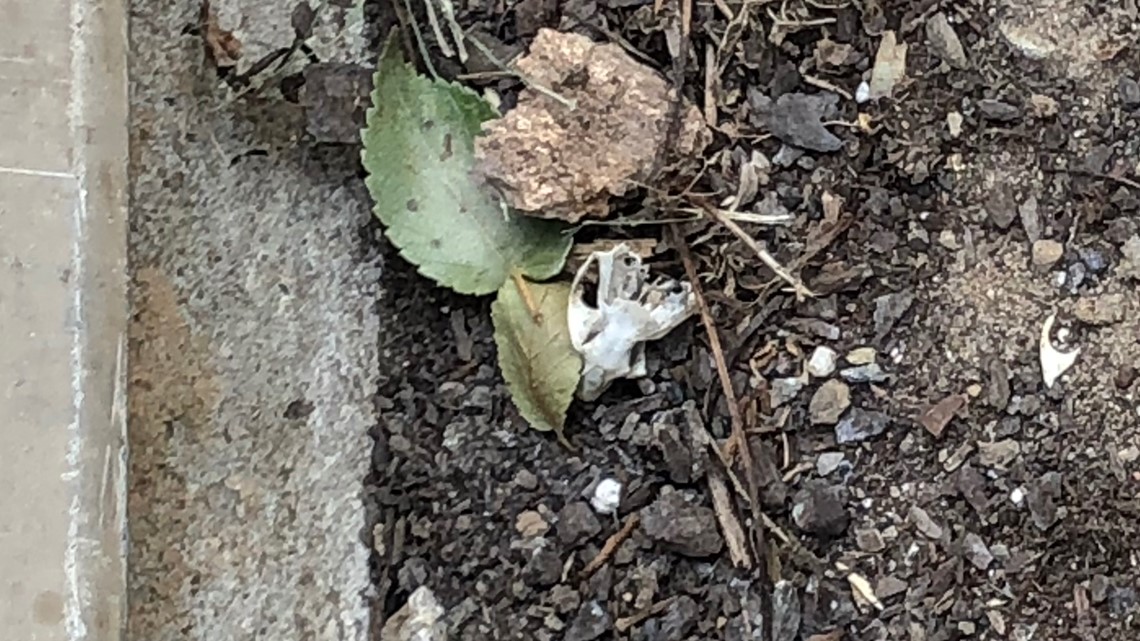
Marine Gunnery Sgt. Nick Starr, his wife Heidi and their two sons moved into a home on Marine Corps Base Quantico in 2017.
“From the moment walking into that house, we could tell something was wrong,” Heidi said.
In January of 2018, a busted pipe left two inches of water in the home.
“I remember hearing what sounded like, it was like a rushing water sound,” she recalled.
The cleanup revealed a bigger issue.
“That's when I first saw what was an alarming amount of black mold all over the stud work, the wood, the drywall behind there, the insulation was covered in black,” Heidi described.

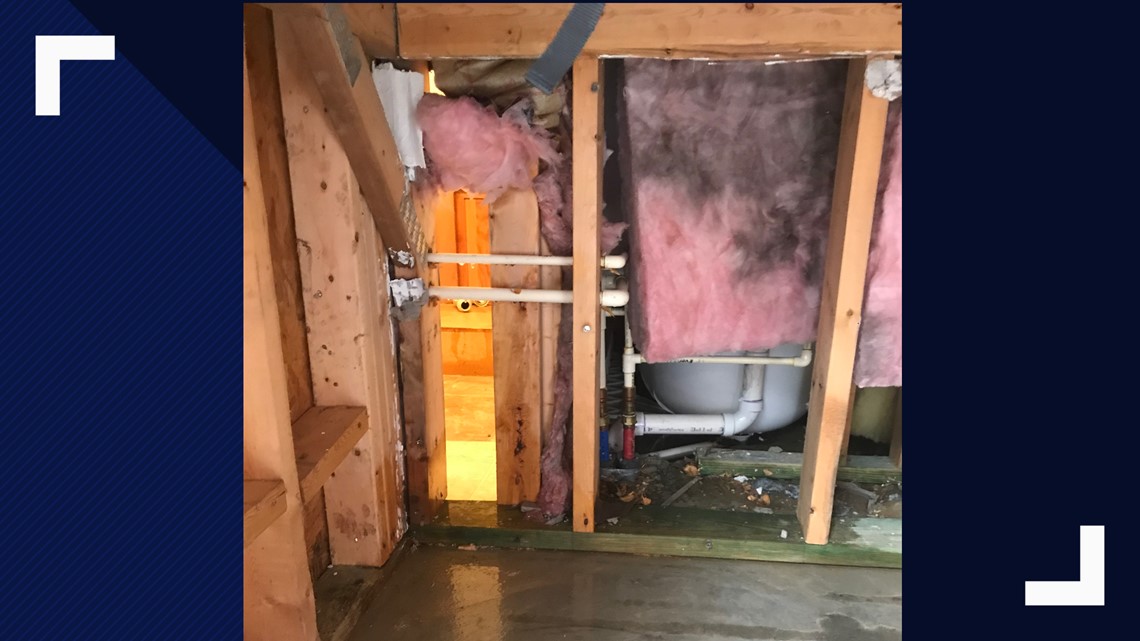
One picture showing the blackened insulation is date-stamped Jan. 3, 2018. Other photos showing repairmen working, and mold still in the home, are date-stamped: Feb. 13, 2018. That's six weeks after workers first found it.
Heidi feared the family had been exposed for quite a while.

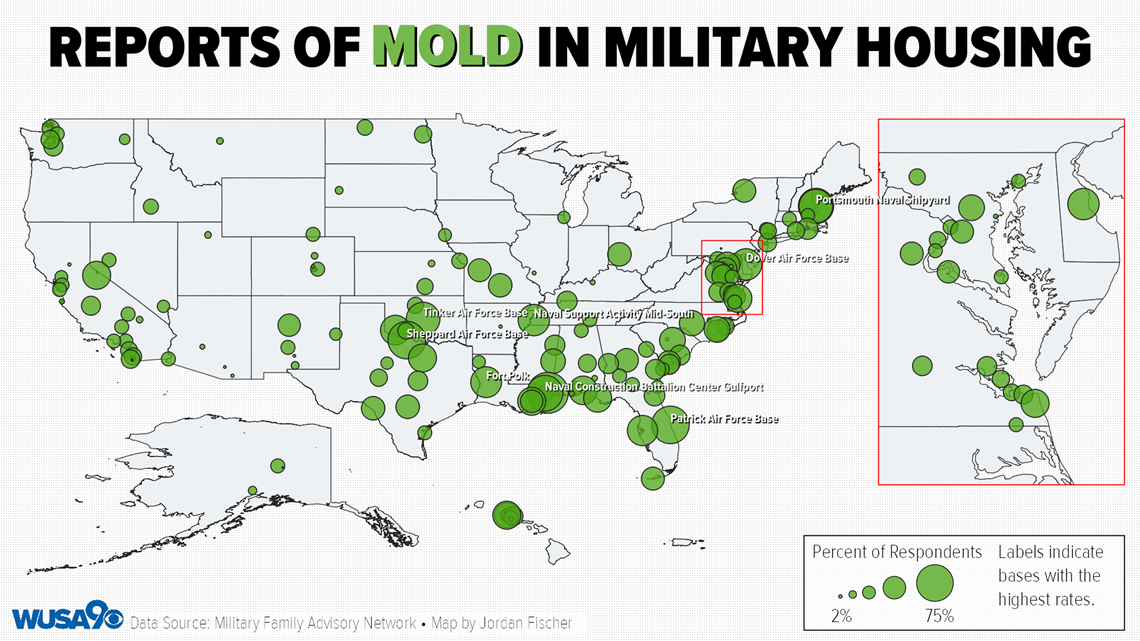
Lincoln Military Housing is the contractor responsible for running and fixing more than 1,100 homes on Quantico. Trent Duffy, the company’s media liaison, said they responded to the Starrs' burst pipe within minutes; the repair work took weeks and was done in phases. Duffy explained maintained the mold in the February photos was in an area they couldn’t see until they started installing the new cabinets.
Lincoln also sent us several documents with information and a statement.
“We welcome and encourage military families to raise issues about their housing and we regret when even one family is dissatisfied with our performance,” Jarl Bliss, President and CEO of Lincoln Military Housing, said. “On an annual basis, mold work orders constitute less than one percent of service requests, even at coastal installations where relative humidity levels are naturally high. We share the Navy’s commitment to making things better for soldiers and their families, and we have hired an independent third- party expert to review our entire moisture and mold management program, including our prevention and remediation procedures. We are also seeking input from residents and the Navy and are committed to improving the living experience in all our base housing."
Wednesday, after the MFAN report was released, Lincoln Military Housing sent another statement.
They outlined several changes they said were added to increase accountability, including an additional oversight position, expanded resident advisory boards, increased staffing and an app residents can track work requests on.
"We realize that none of these actions can make up for any past shortcomings, but they demonstrate our good faith effort to make things better," Lincoln representatives said in their statement. "And these are just a few of the many actions we’ve taken and will continue to take in the months ahead.”
To read their full statement from May 22, click here.
Heidi, on the other hand, said she didn't think she should have to worry about her health at home.
“You don't feel, especially when your hands are tied, that you can't fix the problems yourself," she said. "So, I want to be able to help my kids, protect myself, protect my health, as well and know that my kids aren't forced to live in something like that.”
Lincoln is just one of the providers in the Military Housing Privatization Initiative. Since the program started in the late 1990s, the Department of Defense has privatized 99 percent of its housing.
According to DoD, contracts for these companies last 50 years. But in recent months, the businesses have faced backlash for not providing the quality homes they were supposed to. There are more than 200,000 of them across the country.
“This isn't how we take care of people who make some of the biggest sacrifices for our country,” Shannon Raszadin, a Navy wife and the executive director of the Military Family Advisory Network, said.

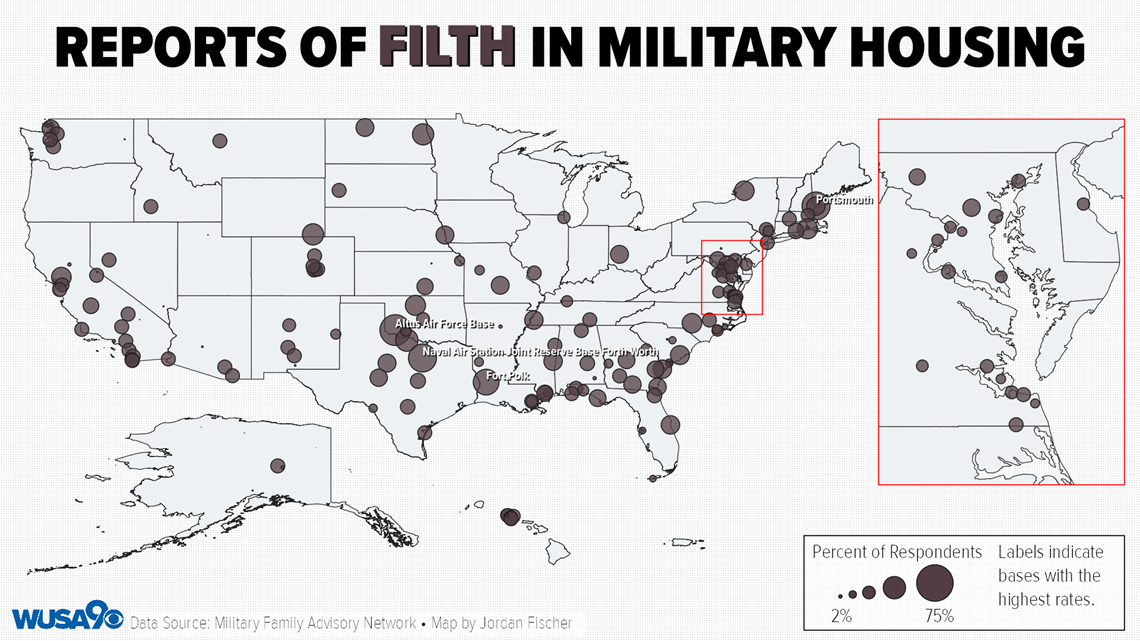
MFAN did a survey of military families and just released the results. The group asked an open-ended question to be able to get the bigger picture: "Describe your experiences living in privatized housing."
10,861 people responded.
“There should never be a scenario where families move into a home that's not safe,” Raszadin added. “I mean, that's a basic need.”
New analysis shows 6,166 of the people who responded said they experienced maintenance issues. We're not talking about small things like a sticky window, but substantial issues that affect their lives. 3,248 said they had mold in their homes and 2,343 noted structural concerns.
All this, while company executives told Congress in February they are reaping the rewards.
Here is an exchange from the Congressional hearing:
Sen. Elizabeth Warren: Mr. Williams?
Christopher Williams (Balfour Beatty Communities): Our net profits for our military housing businesses are around $33 million
Warren: A year?
Williams: A year, pretax.
Sen. Elizabeth Warren: Mr. Picerne?
John Picerne (Corvias Group): Our net profits are closer to $12 to 14 million.
We now also know the biggest issues on our local bases.
Of the people who responded from Quantico, 49 percent listed maintenance, repairs or remediation as an issue and 41 percent of the people noted mold.
Of the people at Fort Meade and Joint Base Anacostia-Bolling, 68 percent and 71 percent, respectively, said maintenance, repairs or remediation were a concern. That adds up to about seven out of ten people who responded.
The Starrs moved from Quantico to Bolling last year.
“We had several thresholds where the carpet wasn't reaching the threshold,” Heidi described. “Strips, metal parts were gashing and cutting feet. We're usually a barefoot family in our home and that's not comfortable when you're worried that your two-year-old is going to run and slice their foot open.”

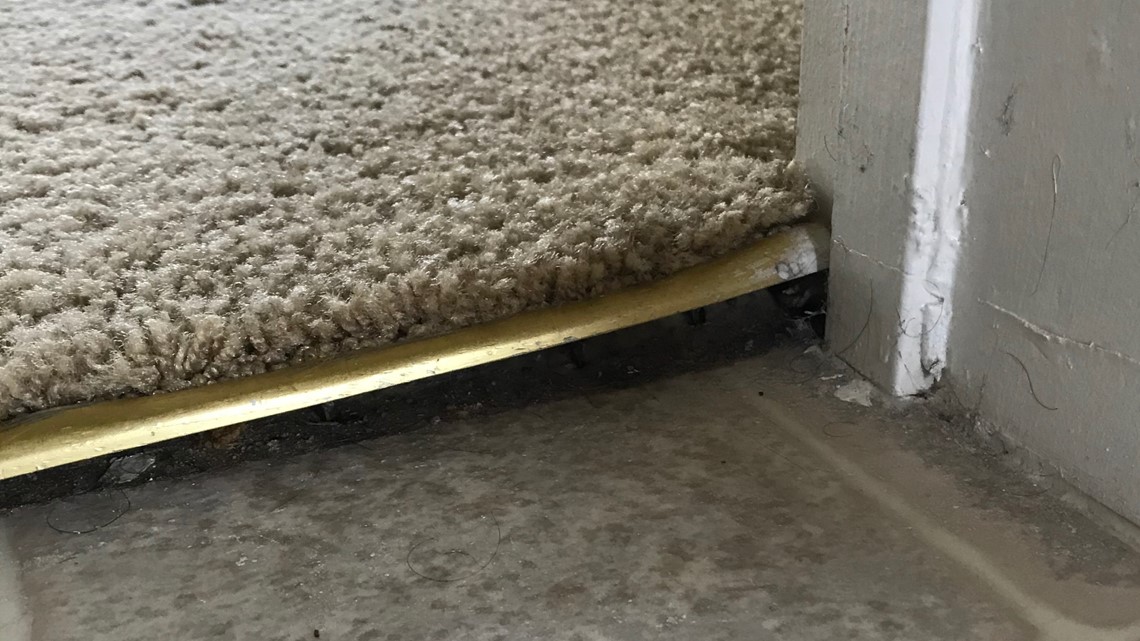
Members of Congress toured their home there.
“They kneeled down to take a picture and two nails popped up through the threshold,” Heidi remembered.
About a year after moving in, the week of our interview, Hunt Companies, which manages housing on that base, decided to replace the flooring.
A spokeswoman for Hunt told WUSA9 they "are aware of the concerns at Bolling" and replaced the Starrs' floors after the third service call about the issue.
“Recognizing the importance of serving those who serve and sacrifice so much for our country, Hunt takes these matters extremely seriously, holds itself accountable and is committed to continuing to make necessary improvements to offer every resident high-quality housing,” VP of Corporate Communications Cindy Gersch wrote. “We understand that this family has made service calls regarding their flooring, which we have addressed. We continue to work with our local team members, in tandem with our Air Force and Navy partners, as well as Hunt Corporate staff, to address all resident concerns as diligently and quickly as possible.”
“There's no reason why we should be here today where this has been raised to a level where Congress has to get involved,” Maryland Congressman Anthony Brown and veteran responded. “The Department of Defense has to do better by our military families.”

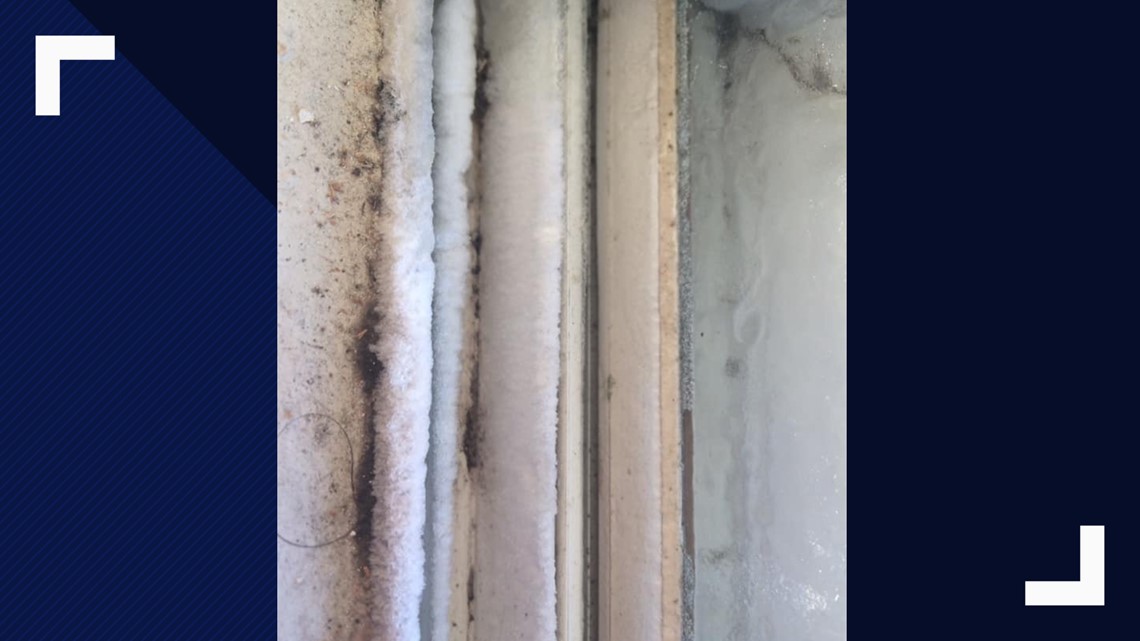
Brown and other lawmakers on the Hill have proposed new legislation to give military families more protections and increase transparency and oversight of these deals. The service branches have announced surveys and hotlines. Their leaders also promised to renegotiate those 50-year contracts for more accountability. The military contractors said they are working to improve their systems.
Congress is also expected to take up this issue when it goes through the defense spending bill.
“This is an issue that's not going to be fixed overnight,” Shannon Raszadin added. “It's going to take a long time. We are seeing the right attention given to it, but I also think there's a lot more that we have to learn.”

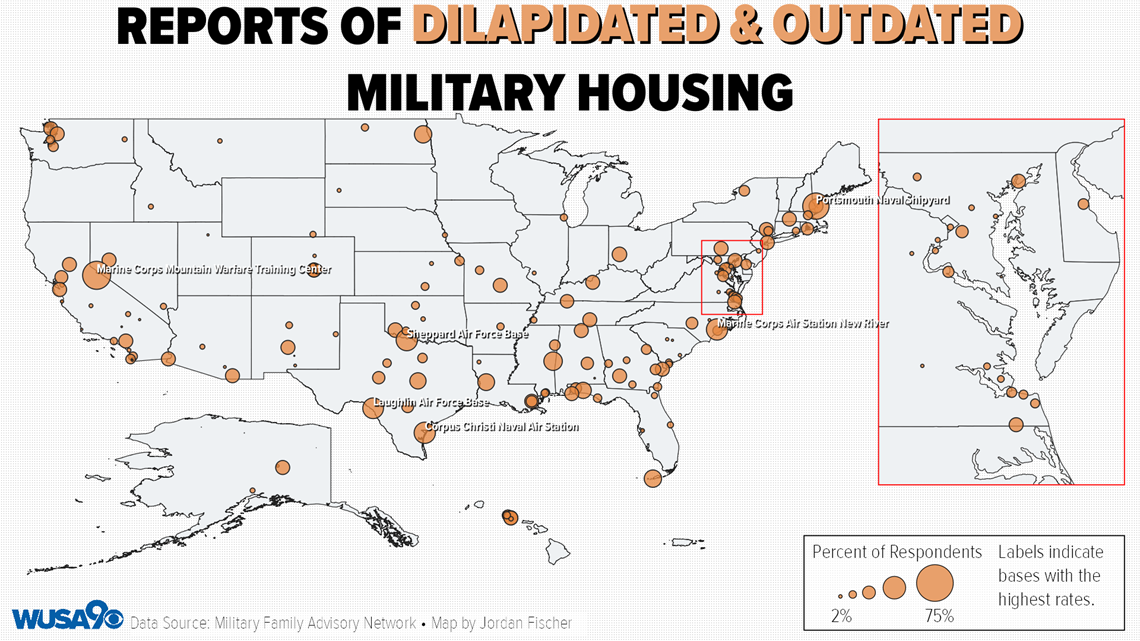
But there's a lot Congress and DoD knew. WUSA9 has uncovered warnings and documented problems in homes going back twenty years. We're working to find out why concrete fixes haven't been discussed until recently. We'll bring you those stories as we continue to investigate.
None of the privatized housing companies would grant an on-camera interview. Here are statements from the other companies that manage housing on bases in our area:
CORVIAS GROUP, Kelly Douglas, Marketing and Media Strategist:
“We want to make sure all residents are satisfied—any resident with a need should call our 24/7 customer service center at 844-346-1490, stop in at their community center or place a service request online at www.meade.corviasmilitaryliving.com
We’re working to deliver the gold standard level of service our residents expect and deserve. We hired more service technicians to handle resident requests more quickly. We moved our resident call centers back to each installation, including Fort Meade, so that residents are talking with someone right down the street when they have an issue. And we support a resident “Bill of Rights,” so that residents feel they are empowered when they have an issue.
We have work to do, but we’re seeing progress. At Fort Meade during the last month, 95.9% of 630 total emergency work orders were completed within 24 hours, and 88.3% of the 2,569 routine work orders were completed within the benchmark of 10 days, and our resident satisfaction data, managed by SatisFacts, reflects 3.99 out of 5.”
BALFOUR BEATTY INVESTMENTS, Maureen Omrod, VP of Marketing and Communications
“Every resident issue, concern and question is—and always has been—important to our team. We handle every service request according to an established policy and protocol, including guidance from our Environmental department and engagement with third-party specialty contractors when necessary. We further utilize the third-party resident survey company SatisFacts to capture resident feedback via online surveys after move-in and all completed service requests, helping to ensure all work has been completed to the resident’s satisfaction or that immediate follow-up is made if any issues or concerns remain.
We use this feedback and other insights to continuously work with our Army, Navy and Air Force partners to identify opportunities and implement solutions to improve privatized military housing and ensure all residents have access to a quality home supported by the highest level of responsive customer service. Balfour Beatty Communities has several initiatives underway across our entire military housing portfolio aimed at improving maintenance responsiveness and quality of workmanship, providing additional training to resident-facing employees to ensure they are providing an exceptional customer service experience, as well as putting resources in place to ensure our residents are being heard, receiving the information they need, and getting their issues and concerns promptly resolved to their satisfaction (see the attached press release from April 2nd which outlines these efforts in more detail).
The top priority for our company, and all of our military property teams, remains taking care of our residents and making sure they are satisfied with all aspects of their living experience with us, from the condition of their home to the quality of their interaction with every member of our team. We will continue to work hand-in-hand with our Army, Navy and Air Force partners with this singular objective in mind.”
CONGRESSIONAL HEARING INFO
You can view and read the entire testimony of February's Congressional hearing here.
RESPONSES FROM MILITARY SERVICE BRANCHES
MARINE CORPS
"I have instructed Commanders to publish policies and take actions to ensure
our Marines, Sailors, and families have the living accommodations they
deserve," said Gen. Robert B. Neller, Commandant of the Marine Corps.
"Ultimately, military family housing is a leadership issue."
Military service branches meet with privatized housing executives
"During the meeting, the secretaries presented the executives a proposed Tenant Bill of Rights and discussed modifications to incentive-fee agreements, the implementation of apps and online tools to improve property-management oversight and work-order processing, and the creation of a privatized-housing lease agreement that would be uniform across all departments and portfolios," a news release from the Army reported.
Full statement:
The Navy is committed to ensuring our Sailors and their families have safe, healthy living quarters and the quality of life they deserve. We have the responsibility and desire to improve the military housing program, and we are moving quickly to do so.
As part of the effort to fully understand the size and scope of the problem, the Navy has reached out to Sailors and their families through personal contact, town halls, and surveys.
Commanding Officers completed 100 percent contact with all Sailors and their families to discuss their housing situation and offer in-home visits to observe potential health, safety and unresolved maintenance issues. As a result of the home visit offer, approximately five percent of Sailors living in Public-Private Venture (PPV) family housing, approximately two percent of Sailors living in government family housing, approximately 14 percent of Sailors living in PPV unaccompanied housing, and approximately two percent of Sailors living in government unaccompanied housing requested a command representative visit to their residence. One hundred percent requested visits to PPV and government housing have been completed, which identified 2,034 issues of which 90.8 percent have been resolved. The Navy will continue to track these work orders, as well as new routine trouble tickets, to completion.
Between February 13 and March 7, every Navy installation commander conducted a town hall to hear directly from Sailors and their families about the state of affairs at each housing community and to better understand specific problems that need attention. The town halls, along with the home visits, have shown that a majority of housing complaints are associated with; poor workmanship, lack of follow-up or customer service, addressing symptoms rather than root cause, and minimal or absent government engagement and oversight. Installation commanders with PPV housing are in the process of hosting a second round of town halls, but overall, are seeing a much lower attendance rate.
Surveys are another tool the Navy uses to understand the current state of housing. The Navy completed an “out-of-cycle” Resident Satisfaction Survey for Sailors and their families living in both family and unaccompanied PPV housing. CEL & Associates, an independent third party, conducts all Navy surveys. The “out-of-cycle” survey launched April 2 and was completed May 9, with an overall response rate of 22 percent. Despite command emphasis and advertisement through social media, letters, and e-mails, this response rate is lower than previous surveys, which have historically had a 34 to 45 percent response rate.
For residents in government-operated family housing, the Resident Satisfaction Survey runs through June 6 and the survey for unaccompanied Sailors living in government-operated housing runs through June 20. The results of current and past surveys will be analyzed and used to further assess and improve our accompanied and unaccompanied housing programs. Additionally, in an effort to improve alignment and provide oversight, the Navy continues to have active recurring senior level engagement with all PPV partners to ensure they are holding property managers and maintenance professionals accountable for housing quality, responsiveness, and customer service. We are also performing a comprehensive review of all business agreements to identify opportunities for improved oversight and accountability.
Going forward, the Navy will continue to ensure oversight and transparency of privatized and government housing through on-going personal contact and resident follow-up, spot checks, town halls, education, increased leadership engagement, and continued stakeholder communication. Additionally, the Navy is an active participant in the Office of the Secretary of Defense led Bill of Rights and universal lease initiatives.
----
Digital investigative reporter Jordan Fischer contributed to this story.
This is one episode in our "Dangers at Home" series. Watch more episodes below.

